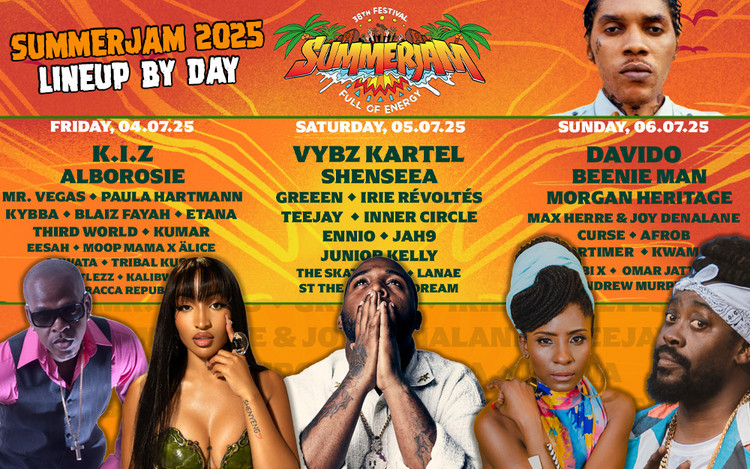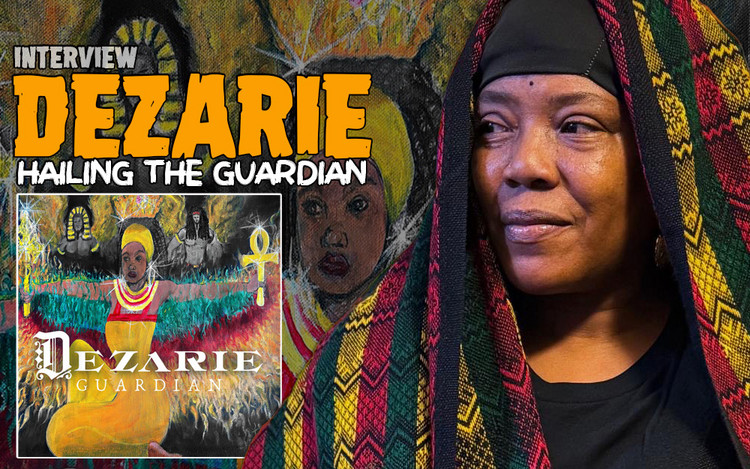Meta & The Cornerstones ADD
Interview: Meta Dia of Meta & The Cornerstones
04/30/2013 by Justine Amadori Ketola
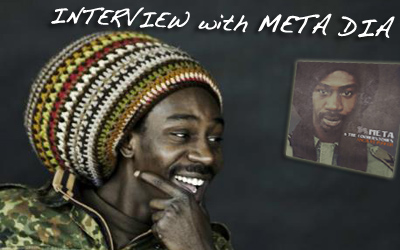
You started your first band back in Senegal back in 2000. What was this comprised of, what was your life as a musician like as a musician starting out?
In Senegal I was in a hip-hop group with one of my cousins and one of my friends. And two years later with two other friends, we were called Yalla Suuren (meaning 'God Bless' in Wolof). So we played lots of shows around Senegal, and the French Cultural Center of Dakar they named us the best group, they organized competitions each year, so we won one year. It was when Hip-Hop entered Africa, we were young, we liked it for the style, for the big jeans, big shirts, big chains, things like that. But it was also loving music and melodies, so it got more serious during the time when we got nominated for best Hip-Hop group. So after I moved to the U.S. i wanted to do Hip-Hop but the reality was pretty much different, so the lifestyle here in the U.S., not being able to speak English when I tried to rap, there was a big accent going on. So, I know how to play guitar, so from guitar playing and singing around, one jazz player named Sean Blackman from Detroit told me, 'Oh you can sing very good bro, you should be singing.' Jam session here and there, in one moment I found it and it was directing me more to reggae.
Growing up in Senegal, were you involved in the mystical Baay Faal tradition, or was your family involved in this tradition of Islam that is so prevalent there?
You know pretty much, because I come from a Fulani tribe, my Mom is Wolof my father is Fulani, so with the tradition of Baay Faal and the Tijaan, are the ones that started it, after people in groups started putting aside, Baay Faal here, Mouride here, Tijani here, Niasse here, what it is it only comes from one root, one family which is the Fulani that introduced the religion of Islam to Africa. Pretty much growing up, my thought from my parents, was all as one, we are Baay Faal we are Tijani, Niasse, we are all one tradition, Baay Faal I have experienced all of it. And I was part of all of it.
Were you dreadlocks there, in Senegal? Did you have dreads?
In Senegal I have braids, like Hip Hop, watching Snoop Dogg, I liked that style of having the two braids. Thats what I was doing. When I come to the U.S. I end up letting my hair dread.
You traveled to Jamaica to record with the great Sidney Mills (of Steel Pulse and Living Room Studios) along with Dean Fraser, Squiddly Cole, The Marleys, U-Roy, Capleton. Explain what this was like coming from the tradition where artists like Alpha Blondy from Ivory Coast and Chachi from Ethiopia have traveled to Jamaica to get some Marley magic at Tuff Gong Studios. What was that like for you?
Yeah it was a wonderful experience with music, I am with life, like we never know what happen tomorrow, only go with the faith and believing in what we are doing. So when I recorded the music, I started having more confidence and faith. I started in New York, jamming with musicians, finding Pro Tools, building music, trying to teach myself more. Listening to Bob Marley, he is part of the development and the vision that I see. Jamaica was one of the great places that I wanted to go, and I never knew too, that I would end up crossing this journey with Steel Pulse. Because when Steel Pulse was playing at that time, I was young in Senegal. I used to hear their name. So those kind of things are close, because you feel that they are so old and you are so young they are up there, pretty much when it happened it was like overwhelmed, went to Jamaica, meet up with Damian, so all of that bring nice vibration that I didn't expect. It's beautiful, it surprised me, and at the same time, I am very thankful and I know there is more. I would say that the whole thing is believing in what you are doing, and traveling, because when you travel you reconnect with people and the music is large and the love is large, its all about that.
What is your band like now, that you are going to be going on tour? What does the band consist of?
The band is still the same members, we changed the bass and drum because we wanted to have a different stoned you know, more like a rootsy and world music. Some of them are still in the family, they jam with us, some they couldn't because of travel situation. So we found a way, the original members are still in the band. And we just have a new bass player, Rupert McKenzie and Wayne Fletcher on drums, very talented musicians. We are cooking a nice meal right now as it happens.
Where do you go in your mind to write a song?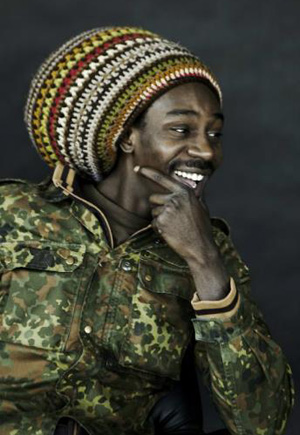 To write a song, I would say this, a lot of the time I cannot just sit down and just try to rhyme and try to write something. A lot of the time my writing comes from conversation with friends, traveling, seeing things. Because if I wasn't a musician I would be a painter, I visualize. So people will tell me things sometimes and I can see the whole picture of it, you know. So my writing is visualizing things and telling stories that uplift the people, peace love and harmony, just the same concepts that I am telling you because I love traveling, I love discovering new cultures, new people. You know all of my writing comes from there, and the spiritual way that I was taught in Senegal. Using the sentences, all of the proverbs, all of the teachings of Cheik Amadou Bamba, of Cheik Tijaan, everybody, Bob Marley, everybody that is positive, all of that. I look for that and I channel myself to those areas, my friends I have met on the street, all of that I channel into the songs.
To write a song, I would say this, a lot of the time I cannot just sit down and just try to rhyme and try to write something. A lot of the time my writing comes from conversation with friends, traveling, seeing things. Because if I wasn't a musician I would be a painter, I visualize. So people will tell me things sometimes and I can see the whole picture of it, you know. So my writing is visualizing things and telling stories that uplift the people, peace love and harmony, just the same concepts that I am telling you because I love traveling, I love discovering new cultures, new people. You know all of my writing comes from there, and the spiritual way that I was taught in Senegal. Using the sentences, all of the proverbs, all of the teachings of Cheik Amadou Bamba, of Cheik Tijaan, everybody, Bob Marley, everybody that is positive, all of that. I look for that and I channel myself to those areas, my friends I have met on the street, all of that I channel into the songs.
You are about to tour to France what do the French fans have in store as well as those at Afro Pfingsten festival in Switzerland and all of the other great events you have coming up in May 2013?
Tallawah, we are working for them for the past two years, and they have been booking all of the shows. We want to give them a big big up. They have been helping us with a reggae band called Dubtik, they have introduced us to the French market from a show we played at the Zenith a couple of years ago. Johan, another agent in Belgium, these are the people that introduced us to the market there. We are very excited for the upcoming tour and hopefully we will make more connections to forward the peace, love and harmony.
Have you performed in Africa since you left ten years ago or more?
Africa I went in 2010, I didn't go with the band, I went to visit my family because after ten years I didn't go back home, it was more like going to see my Mom, my parents. I ended up going to radio stations playing the music, but it was funny, a lot of people would be like 'Wow, we don't think it you,' because you rap, like Senegal, Africa all of that, and you bring some Jamaican music and try to play it on the radio. The album was more like English and a little bit of French. It was hard to project it the way I wanted because I wasn't with a band. I could do it and get the people to go on the internet and check out the music. Now I feel very happy with Facebook and all of this technology which is wonderful people are discovering the work, seeing the job and appreciating and looking forward for us to come there. And us too, we are looking forward to be there, definitely, to play for my public, that is one of my dreams.
How did the song evolve, "Beloved Africa" with Damian Marley?
When we were at Tuff Gong, the first day we said, we were going to do a song together, but we didn't even know which song, and we played lots of jam sessions, one night for a lot of hours. And when he heard the pre-production of some of the album, and he heard the song and he loved the song, Beloved Africa. So we decided lets put it together, and we did some writing in the studio, and nailed it down.
What was the inspiration for the song "Bahia" on the album?
The album is more like traveling and stories, two years ago I wanted to go to Bahia, and I wanted to go to Mexico to write about the Mayan and Jamaica. But I didn't end up making it to Bahia, I was a little sick. For several months I wasn't feeling well so that I didn't end up discovering Bahia. But in this song, I am not there but from the vision I have of Bahia, with the connection with Senegal, with the spirt of the water which is Yemenja which is the spirit of the water and in Senegal the spirit of the water we call Kumba Lumba. In Bahia they have Yemenja, I showed this connection of Kumba Lumba, which is the harmony and the ancestors and it is a great honor on our ancestors because Brazil like Africa, Africa is like Brazil, one people. So I was pretty much talking about Bahia in that sense. Explaining what they each have, and the links that they have, more like describing.
Where was the song "Anywhere For Love" recorded? It sounds like it is live and acoustic?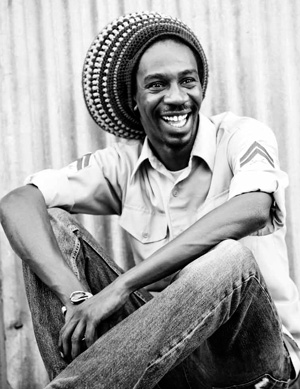 It was recorded live in my studio, we just sit down and jam, and one of my manager come and we decided to put it in the album for the fans. Because that request was made so I felt like I wasn't the only one that could choose the songs, they are going to be there. I wanted to make them feel happy about that song, because there are no musicians, just the guitar and vocals. That's why we put it in the album.
It was recorded live in my studio, we just sit down and jam, and one of my manager come and we decided to put it in the album for the fans. Because that request was made so I felt like I wasn't the only one that could choose the songs, they are going to be there. I wanted to make them feel happy about that song, because there are no musicians, just the guitar and vocals. That's why we put it in the album.
Ancient Power has a real single type of "bounce" to it. What is the plan with this song, is it being pushed as a single?
Yes, definitely, with all of the songs in the album, because all of these songs are written from the heart, and without the heart we are nothing. All of these songs are written to push, the way I can. Because the Ancient Power term is referred to a lot of the time to music, grounded to the roots, to the Baay Faal community that we have in Senegal. It was that love and what we do with music and that we want to promote, we want to promote, we want to uplift, we want peace, so that is the core of Ancient Power, that song. To just bring back the people for observing and paying attention to the conscious music and not playing the foolish music.
The last song on the album is just you and piano, "Without Heart", how did you create this song?
I actually wrote that four years ago and it used to be guitar, we did a lot of versions of that song and so my keyboardist here, Aya Kato from Japan, when she heard it, that was actually a year ago, that was where we first jammed together with the piano. So we were like, 'Ok we are gonna do piano and guitar.' So when we went to Jamaica it was the one moment we have when the keyboards was doing nothing. It was her playing and me singing and it was recorded.
You have an interesting name, Meta, how did you get this name?
My mom called me Meta, I get it from there and in my neighborhood everyone called me Meta and some would reverse it and call me Amet, so when I come to the U.S. and the Spanish people tell me, 'Oh, you know meta means gold?' So you have an interesting goal of the day, I hear metaphysics. The people in New York are telling me it is love and kindness, but all of them I heard are very wonderful and positive.
Tomorrow [April 29th] you appear on Sirius XM radio in New York with Pat McKay live, how are you going to present, is it going to semi-acoustic, or is it going to be the whole band?
Its going to be the whole band live tomorrow. We are very excited, we have been rehearsing like crazy maniacs.
The show at Poisson Rouge on Tuesday [April 30th] is a release party, will you have CD's and merchandise on sale and will you do a meet and greet after the set?
We will have albums, tee shirts and music and hopefully friends and we are a bit nervous.
Any final message you have to say to the reggae massive on Reggaeville.com worldwide?
I would say, peace, love and harmony always. And I would say that it is very important because reggae is the heartbeat, and so we should be definitely aware of the lyrics, not just the music, but reggae should continue the teaching and that is what I would say. Because the reggae is the music that teaches, it is for meditation, it is for upliftment. So we really have to be aware of what we are promoting out there, to make sure we keep the roots, and not let that go away. We have to keep it live and raw.





